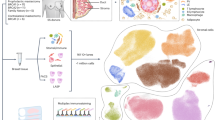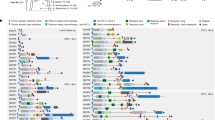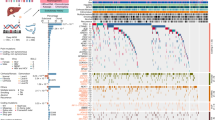Abstract
Recently single-cell whole-exome sequencing (scWES) has deeply expanded and sharpened our knowledge of cancer evolution and subclonality. Herein, with scWES and matched bulk whole-exome sequencing (bulk WES) on two colorectal cancer (CRC) patients with normal or adenomatous polyps, we found that both the adenoma and cancer were of monoclonal origin, and both shared partial mutations in the same signaling pathways, but each showed a specific spectrum of heterogeneous somatic mutations. In addition, the adenoma and cancer further developed intratumor heterogeneity with the accumulation of nonrandom somatic mutations specifically in GPCR, PI3K-Akt and FGFR signaling pathways. We identified novel driver mutations that developed during adenoma and cancer evolution, particularly in OR1B1 (GPCR signaling pathway) for adenoma evolution, and LAMA1 (PI3K-Akt signaling pathway) and ADCY3 (FGFR signaling pathway) for CRC evolution. In summary, we demonstrated that both colorectal adenoma and CRC are monoclonal in origin, and the CRCs further diversified into different subclones with heterogeneous mutation profiles accumulating in GPCR, PI3K-Akt and FGFR signaling pathways. ScWES provides evidence for the importance of mutations in certain pathways that would not be as apparent from bulk sequencing of tumors, and can potentially establish whether specific mutations are mutually exclusive or occur sequentially in the same subclone of cells.
This is a preview of subscription content, access via your institution
Access options
Subscribe to this journal
Receive 50 print issues and online access
$259.00 per year
only $5.18 per issue
Buy this article
- Purchase on Springer Link
- Instant access to full article PDF
Prices may be subject to local taxes which are calculated during checkout






Similar content being viewed by others
Abbreviations
- CRC:
-
colorectal cancer
- CAN:
-
copy number alteration
- GPCR:
-
G-protein coupled receptors
- PCA:
-
principal components analysis
- scWES:
-
single-cell whole-exome sequencing
- bulk WES:
-
bulk whole-exome sequencing.
References
Patel SG, Ahnen DJ . Familial colon cancer syndromes: an update of a rapidly evolving field. Curr Gastroenterol Rep 2012; 14: 428–438.
Fearon ER, Vogelstein B . A genetic model for colorectal tumorigenesis. Cell 1990; 61: 759–767.
Grady WM, Carethers JM . Genomic and epigenetic instability in colorectal cancer pathogenesis. Gastroenterology 2008; 135: 1079–1099.
Lichtenstein P, Holm NV, Verkasalo PK, Iliadou A, Kaprio J, Koskenvuo M et al. Environmental and heritable factors in the causation of cancer—analyses of cohorts of twins from Sweden, Denmark, and Finland. N Engl J Med 2000; 343: 78–85.
Vasen HF . Clinical diagnosis and management of hereditary colorectal cancer syndromes. J Clin Oncol 2000; 18 (21 Suppl): 81S–92S.
Bodmer WF, Bailey CJ, Bodmer J, Bussey HJ, Ellis A, Gorman P et al. Localization of the gene for familial adenomatous polyposis on chromosome 5. Nature 1987; 328: 614–616.
Peters U, Bien S, Zubair N . Genetic architecture of colorectal cancer. Gut 2015; 64: 1623–1636.
De Roock W, Claes B, Bernasconi D, De Schutter J, Biesmans B, Fountzilas G et al. Effects of KRAS, BRAF, NRAS, and PIK3CA mutations on the efficacy of cetuximab plus chemotherapy in chemotherapy-refractory metastatic colorectal cancer: a retrospective consortium analysis. Lancet Oncol 2010; 11: 753–762.
Cancer Genome Atlas Network. Comprehensive molecular characterization of human colon and rectal cancer. Nature 2012; 487: 330–337.
Carethers JM, Jung BH . Genetics and genetic biomarkers in sporadic colorectal cancer. Gastroenterology 2015; 149: 1177–1190.e3.
Sottoriva A, Kang H, Ma Z, Graham TA, Salomon MP, Zhao J et al. A Big Bang model of human colorectal tumor growth. Nat Genet 2015; 47: 209–216.
Wang Y, Waters J, Leung ML, Unruh A, Roh W, Shi X et al. Clonal evolution in breast cancer revealed by single nucleus genome sequencing. Nature 2014; 512: 155–160.
Navin N, Kendall J, Troge J, Andrews P, Rodgers L, McIndoo J et al. Tumour evolution inferred by single-cell sequencing. Nature 2011; 472: 90–94.
Xu X, Hou Y, Yin X, Bao L, Tang A, Song L et al. Single-cell exome sequencing reveals single-nucleotide mutation characteristics of a kidney tumor. Cell 2012; 148: 886–895.
Hou Y, Song L, Zhu P, Zhang B, Tao Y, Xu X et al. Single-cell exome sequencing and monoclonal evolution of a JAK2-negative myeloproliferative neoplasm. Cell 2012; 148: 873–885.
Yu C, Yu J, Yao X, Wu WK, Lu Y, Tang S et al. Discovery of biclonal origin and a novel oncogene SLC12A5 in colon cancer by single-cell sequencing. Cell Res 2014; 24: 701–712.
Zhang X, Marjani SL, Hu Z, Weissman SM, Pan X, Wu S . Single-cell sequencing for precise cancer research: progress and prospects. Cancer Res 2016; 76: 1305–1312.
Lohr JG, Adalsteinsson VA, Cibulskis K, Choudhury AD, Rosenberg M, Cruz-Gordillo P et al. Whole-exome sequencing of circulating tumor cells provides a window into metastatic prostate cancer. Nat Biotechnol 2014; 32: 479–484.
Strum WB . Colorectal adenomas. N Engl J Med 2016; 374: 1065–1075.
Helleday T, Eshtad S, Nik-Zainal S . Mechanisms underlying mutational signatures in human cancers. Nat Rev Genet 2014; 15: 585–598.
Alexandrov LB, Nik-Zainal S, Wedge DC, Aparicio SA, Behjati S, Biankin AV et al. Signatures of mutational processes in human cancer. Nature 2013; 500: 415–421.
Katayama K, Noguchi K, Sugimoto Y . FBXO15 regulates P-glycoprotein/ABCB1 expression through the ubiquitin—proteasome pathway in cancer cells. Cancer Sci 2013; 104: 694–702.
Ashktorab H, Rahi H, Wansley D, Varma S, Shokrani B, Lee E et al. Toward a comprehensive and systematic methylome signature in colorectal cancers. Epigenetics 2013; 8: 807–815.
Lind GE, Danielsen SA, Ahlquist T, Merok MA, Andresen K, Skotheim RI et al. Identification of an epigenetic biomarker panel with high sensitivity and specificity for colorectal cancer and adenomas. Mol Cancer 2011; 10: 85.
Seneviratne D, Ma J, Tan X, Kwon YK, Muhammad E, Melhem M et al. Genomic instability causes HGF gene activation in colon cancer cells, promoting their resistance to necroptosis. Gastroenterology 2015; 148: 181–91 e17.
Farrell C, Crimm H, Meeh P, Croshaw R, Barbar T, Vandersteenhoven JJ et al. Somatic mutations to CSMD1 in colorectal adenocarcinomas. Cancer Biol Ther 2008; 7: 609–613.
Lederer A, Herrmann P, Seehofer D, Dietel M, Pratschke J, Schlag P et al. Metastasis-associated in colon cancer 1 is an independent prognostic biomarker for survival in Klatskin tumor patients. Hepatology 2015; 62: 841–850.
Stein U, Walther W, Arlt F, Schwabe H, Smith J, Fichtner I et al. MACC1, a newly identified key regulator of HGF-MET signaling, predicts colon cancer metastasis. Nat Med 2009; 15: 59–67.
Palamaro L, Romano R, Fusco A, Giardino G, Gallo V, Pignata C . FOXN1 in organ development and human diseases. Int Rev Immunol 2014; 33: 83–93.
Rowe J, Calegari F, Taverna E, Longhi R, Rosa P . Syntaxin 1A is delivered to the apical and basolateral domains of epithelial cells: the role of munc-18 proteins. J Cell Sci 2001; 114 (Pt 18): 3323–3332.
Ashktorab H, Schaffer AA, Daremipouran M, Smoot DT, Lee E, Brim H . Distinct genetic alterations in colorectal cancer. PLoS One 2010; 5: e8879.
Ross JB, Huh D, Noble LB, Tavazoie SF . Identification of molecular determinants of primary and metastatic tumour re-initiation in breast cancer. Nat Cell Biol 2015; 17: 651–664.
Kanojia D, Nagata Y, Garg M, Lee DH, Sato A, Yoshida K et al. Genomic landscape of liposarcoma. Oncotarget 2015; 6: 42429–42444.
Tsukahara T, Matsuda Y, Haniu H . Cyclic phosphatidic acid stimulates cAMP production and inhibits growth in human colon cancer cells. PLoS One 2013; 8: e81139.
Latini FR, Hemerly JP, Freitas BC, Oler G, Riggins GJ, Cerutti JM . ABI3 ectopic expression reduces in vitro and in vivo cell growth properties while inducing senescence. BMC Cancer 2011; 11: 11.
Wang Z, Li T, Zhang W, You L, Zhao Y, Xia M et al. Variants in DENND1A and LHCGR are associated with endometrioid adenocarcinoma. Gynecol Oncol 2012; 127: 403–405.
Charbonneau B, Maurer MJ, Fredericksen ZS, Zent CS, Link BK, Novak AJ et al. Germline variation in complement genes and event-free survival in follicular and diffuse large B-cell lymphoma. Am J Hematol 2012; 87: 880–885.
Zhang R, Song C . Loss of CSMD1 or 2 may contribute to the poor prognosis of colorectal cancer patients. Tumour Biol 2014; 35: 4419–4423.
Gylfe AE, Sirkia J, Ahlsten M, Jarvinen H, Mecklin JP, Karhu A et al. Somatic mutations and germline sequence variants in patients with familial colorectal cancer. Int J Cancer 2010; 127: 2974–2980.
Teng G, Maman Y, Resch W, Kim M, Yamane A, Qian J et al. RAG represents a widespread threat to the lymphocyte genome. Cell 2015; 162: 751–765.
Mangerich A, Knutson CG, Parry NM, Muthupalani S, Ye W, Prestwich E et al. Infection-induced colitis in mice causes dynamic and tissue-specific changes in stress response and DNA damage leading to colon cancer. Proc Natl Acad Sci USA 2012; 109: E1820–E1829.
Lum AM, Wang BB, Beck-Engeser GB, Li L, Channa N, Wabl M . Orphan receptor GPR110, an oncogene overexpressed in lung and prostate cancer. BMC Cancer 2010; 10: 40.
Gerlinger M, Rowan AJ, Horswell S, Larkin J, Endesfelder D, Gronroos E et al. Intratumor heterogeneity and branched evolution revealed by multiregion sequencing. N Engl J Med 2012; 366: 883–892.
Zhang J, Fujimoto J, Zhang J, Wedge DC, Song X, Zhang J et al. Intratumor heterogeneity in localized lung adenocarcinomas delineated by multiregion sequencing. Science 2014; 346: 256–259.
Cebrat M, Strzadala L, Kisielow P . Wnt inhibitory factor-1: a candidate for a new player in tumorigenesis of intestinal epithelial cells. Cancer Lett 2004; 206: 107–113.
Kober P, Bujko M, Oledzki J, Tysarowski A, Siedlecki JA . Methyl-CpG binding column-based identification of nine genes hypermethylated in colorectal cancer. Mol Carcinog 2011; 50: 846–856.
Huang L, Ma F, Chapman A, Lu S, Xie XS . Single-cell whole-genome amplification and sequencing: methodology and applications. Annu Rev Genomics Hum Genet 2015; 16: 79–102.
Lanza G, Matteuzzi M, Gafa R, Orvieto E, Maestri I, Santini A et al. Chromosome 18q allelic loss and prognosis in stage II and III colon cancer. Int J Cancer 1998; 79: 390–395.
Kirley SD, D'Apuzzo M, Lauwers GY, Graeme-Cook F, Chung DC, Zukerberg LR . The cables gene on chromosome 18Q regulates colon cancer progression in vivo. Cancer Biol Ther 2005; 4: 861–863.
Gemoll T, Auer G, Ried T, Habermann JK . Genetic instability and disease prognostication. Recent Results Cancer Res 2015; 200: 81–94.
Pino MS, Chung DC . The chromosomal instability pathway in colon cancer. Gastroenterology 2010; 138: 2059–2072.
Matano M, Date S, Shimokawa M, Takano A, Fujii M, Ohta Y et al. Modeling colorectal cancer using CRISPR-Cas9-mediated engineering of human intestinal organoids. Nat Med 2015; 21: 256–262.
Acknowledgements
We thank Dr Sherman Weissman for his critical comments on the manuscript. We are indebted to all the individuals who consented to participate in this study. ScWES and bulk WES was performed at the Genseeq Company. The sequenced data was analyzed by Yunkang Biotechnology Co. Ltd. This work was supported by Natural Science Foundation of Zhejiang Province (LZ15H220001 and LY14H160005), Zhejiang Medical and Health Ministry Training Program (2015PYA009), The Science and Technology of Hangzhou Medical and Health Project (2012ZD001), National Natural Science Foundation of China (CN; 81402529).
Author contributions
SW and HW conceived the study. QH and HW performed the experiments under the supervision of SW, ZH, B-GJ and HW. YL, SL, HZ, JY and ZJ prepared the reagents and samples. HW analyzed the data. HW prepared the manuscript. SW, B-GJ, XP and X-YZ reviewed the results and the discussion of the manuscript. All the authors read and approved the manuscript.
Author information
Authors and Affiliations
Corresponding authors
Ethics declarations
Competing interests
The authors declare no conflict of interest.
Additional information
Supplementary Information accompanies this paper on the Oncogene website
Supplementary information
Rights and permissions
About this article
Cite this article
Wu, H., Zhang, XY., Hu, Z. et al. Evolution and heterogeneity of non-hereditary colorectal cancer revealed by single-cell exome sequencing. Oncogene 36, 2857–2867 (2017). https://doi.org/10.1038/onc.2016.438
Received:
Revised:
Accepted:
Published:
Issue Date:
DOI: https://doi.org/10.1038/onc.2016.438
This article is cited by
-
Intestinal cellular heterogeneity and disease development revealed by single-cell technology
Cell Regeneration (2022)
-
SIEVE: joint inference of single-nucleotide variants and cell phylogeny from single-cell DNA sequencing data
Genome Biology (2022)
-
Single-cell transcriptomic profiling unravels the adenoma-initiation role of protein tyrosine kinases during colorectal tumorigenesis
Signal Transduction and Targeted Therapy (2022)
-
Automated histological classification for digital pathology images of colonoscopy specimen via deep learning
Scientific Reports (2022)
-
Intratumor genetic heterogeneity and clonal evolution to decode endometrial cancer progression
Oncogene (2022)



